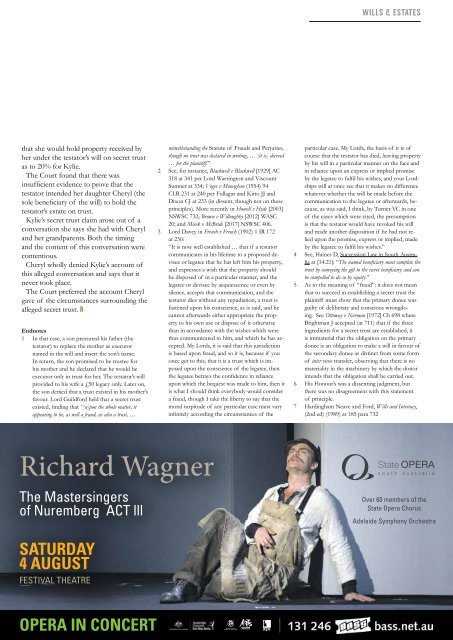LSB July 2018_Web
You also want an ePaper? Increase the reach of your titles
YUMPU automatically turns print PDFs into web optimized ePapers that Google loves.
WILLS & ESTATES<br />
that she would hold property received by<br />
her under the testator’s will on secret trust<br />
as to 20% for Kylie.<br />
The Court found that there was<br />
insufficient evidence to prove that the<br />
testator intended her daughter Cheryl (the<br />
sole beneficiary of the will) to hold the<br />
testator’s estate on trust.<br />
Kylie’s secret trust claim arose out of a<br />
conversation she says she had with Cheryl<br />
and her grandparents. Both the timing<br />
and the content of this conversation were<br />
contentious.<br />
Cheryl wholly denied Kylie’s account of<br />
this alleged conversation and says that it<br />
never took place.<br />
The Court preferred the account Cheryl<br />
gave of the circumstances surrounding the<br />
alleged secret trust. B<br />
Endnotes<br />
1 In that case, a son pressured his father (the<br />
testator) to replace the mother as executor<br />
named in the will and insert the son’s name.<br />
In return, the son promised to be trustee for<br />
his mother and he declared that he would be<br />
executor only in trust for her. The testator’s will<br />
provided to his wife a £50 legacy only. Later on,<br />
the son denied that a trust existed in his mother’s<br />
favour. Lord Guildford held that a secret trust<br />
existed, finding that “[u]pon the whole matter, it<br />
appearing to be, as well a fraud, as also a trust, …<br />
notwithstanding the Statute of Frauds and Perjuries,<br />
though no trust was declared in writing, … [it is] decreed<br />
… for the plaintiff.”<br />
2 See, for instance, Blackwell v Blackwell [1929] AC<br />
318 at 341 per Lord Warrington and Viscount<br />
Sumner at 334; Voges v Monaghan (1954) 94<br />
CLR 231 at 240 per Fullagar and Kitto JJ and<br />
Dixon CJ at 233 (in dissent, though not on these<br />
principles). More recently in Howell v Hyde [2003]<br />
NSWSC 732; Brown v Willoughby [2012] WASC<br />
20; and Misek v McBride [2017] NSWSC 406.<br />
3 Lord Davey in French v French (1902) 1 IR 172<br />
at 230:<br />
“It is now well established … that if a testator<br />
communicates in his lifetime to a proposed devisee<br />
or legatee that he has left him his property,<br />
and expresses a wish that the property should<br />
be disposed of in a particular manner, and the<br />
legatee or devisee by acquiescence or even by<br />
silence, accepts that communication, and the<br />
testator dies without any repudiation, a trust is<br />
fastened upon his conscience, as is said, and he<br />
cannot afterwards either appropriate the property<br />
to his own use or dispose of it otherwise<br />
than in accordance with the wishes which were<br />
thus communicated to him, and which he has accepted.<br />
My Lords, it is said that this jurisdiction<br />
is based upon fraud, and so it is, because if you<br />
once get to this, that it is a trust which is imposed<br />
upon the conscience of the legatee, then<br />
the legatee betrays the confidence in reliance<br />
upon which the bequest was made to him, then it<br />
is what I should think everybody would consider<br />
a fraud, though I take the liberty to say that the<br />
moral turpitude of any particular case must vary<br />
infinitely according the circumstances of the<br />
particular case. My Lords, the basis of it is of<br />
course that the testator has died, leaving property<br />
by his will in a particular manner on the face and<br />
in reliance upon an express or implied promise<br />
by the legatee to fulfil his wishes, and your Lordships<br />
will at once see that it makes no difference<br />
whatever whether the will be made before the<br />
communication to the legatee or afterwards, because,<br />
as was said, I think, by Turner VC in one<br />
of the cases which were cited, the presumption<br />
is that the testator would have revoked his will<br />
and made another disposition if he had not relied<br />
upon the promise, express or implied, made<br />
by the legatee to fulfil his wishes.”<br />
4 See, Haines D, Succession Law in South Australia<br />
at [14.21]: “The named beneficiary must complete the<br />
trust by conveying the gift to the secret beneficiary and can<br />
be compelled to do so by equity.”<br />
5 As to the meaning of “fraud”: it does not mean<br />
that to succeed in establishing a secret trust the<br />
plaintiff must show that the primary donee was<br />
guilty of deliberate and conscious wrongdoing.<br />
See Ottoway v Norman [1972] Ch 698 where<br />
Brightman J accepted (at 711) that if the three<br />
ingredients for a secret trust are established, it<br />
is immaterial that the obligation on the primary<br />
donee is an obligation to make a will in favour of<br />
the secondary donee as distinct from some form<br />
of inter vivos transfer, observing that there is no<br />
materiality in the machinery by which the donor<br />
intends that the obligation shall be carried out.<br />
6 His Honour’s was a dissenting judgment, but<br />
there was no disagreement with this statement<br />
of principle.<br />
7 Hardingham Neave and Ford, Wills and Intestacy,<br />
(2nd ed) (1989) at 185 para 732<br />
Richard Wagner<br />
The Mastersingers<br />
of Nuremberg ACT lll<br />
Over 60 members of the<br />
State Opera Chorus<br />
Adelaide Symphony Orchestra<br />
SATURDAY<br />
4 AUGUST<br />
FESTIVAL THEATRE<br />
OPERA IN CONCERT


















